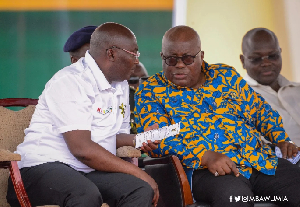Ghanaian government’s move to deepen its financial services sector is putting foreign banks operating in that country on their toes as the scramble for investments heats up with some months to the December 2009 deadline for them to shore up their capital to a minimum of GHc60 million ($50million), about N7.4 billion.
Coming at a time of worsening global credit crunch, some of the banks’ executives are under intense pressure to innovate ways out of their present challenge, as the effects of the crunch may make it difficult for them to get all the fund they need from their parent body.
“We have an investor currently on board, but we are still talking,” a CEO of one of the Nigerian banks told BusinessDay in Accra. The CEO who would not disclose the volume of capital his bank is likely to get from the prospective investors, said the bank is looking forward to surpassing the minimum requirement when the deal is finally sealed.
The minimum capital base of any Nigerian bank is N25 billion.
BusinessDay’s investigations at Ghana’s central bank, Bank of Ghana(BoG), reveals that the six Nigerian banks currently operating in Ghana, would need to inject about N42 billion ($300 million) into their present portfolio to avoid any regulatory sledge hammer. “Given the size of the parent companies at the moment, I do not expect that the sum would be a challenge to them,” Kwaku Bentum, a financial analyst said of the Nigerian banks.
Unlike the situation during the recapitalisation exercise in Nigeria, not many of the foreign banks in Ghana are considering going to the stock market to raise capital for reasons ranging from the lull in the market at the moment, to assurances from their main owners. The prices of most shares in the Ghana Stock Exchange have remained stagnant since January, because of investor apathy.
“The scramble for additional investment is high. The global financial crisis is not helping at all. The most challenged, perhaps, are those banks with their parent bodies in Europe and Asia. Investors from those areas are very shy to move funds beyond borders now. But they are all comparatively big enough, such that we do not foresee any major problem,” insisted a top BoG official in Accra.
While the foreign banks have up to December 2009 to meet the minimum capital, the local ones have an extended deadline of 2012. According to the BoG official, the central bank knows that the new capital requirement is likely to pose challenge to some of the foreign operators, given that the situation in the global credit market is not likely to get better before the end of the year.
The six Nigerian banks currently operating in Ghana are the United Bank for Africa (UBA), Access Bank, Zenith Bank and GTBank. Others are Amalgamated Bank, a subsidiary of Mic Mac Ventures, owners of Oceanic Bank, and HFC Bank, a subsidiary of Union Bank plc.
“We did not create the separate deadlines to ‘punish’ foreign banks. We are fully aware that the bank recapitalisation scheme is not a panacea to all our financing needs and may not necessarily lead to increased lines of credit for struggling businesses, but we’ve seen what happened in Nigeria and other parts of the world. Besides, they (foreign banks) have people to fall back to, unlike the local banks,” another top BoG official explained.
Aside those from Nigeria, the Ghanaian banking sector also boasts of investments from Europe and Asia. Only last year, one of India’s leading banks, Bank of Baroda, began operations in the country. Barclays Bank, meanwhile, remains one of the oldest operators in the country.
Business News of Monday, 9 February 2009
Source: Businesstoday
















